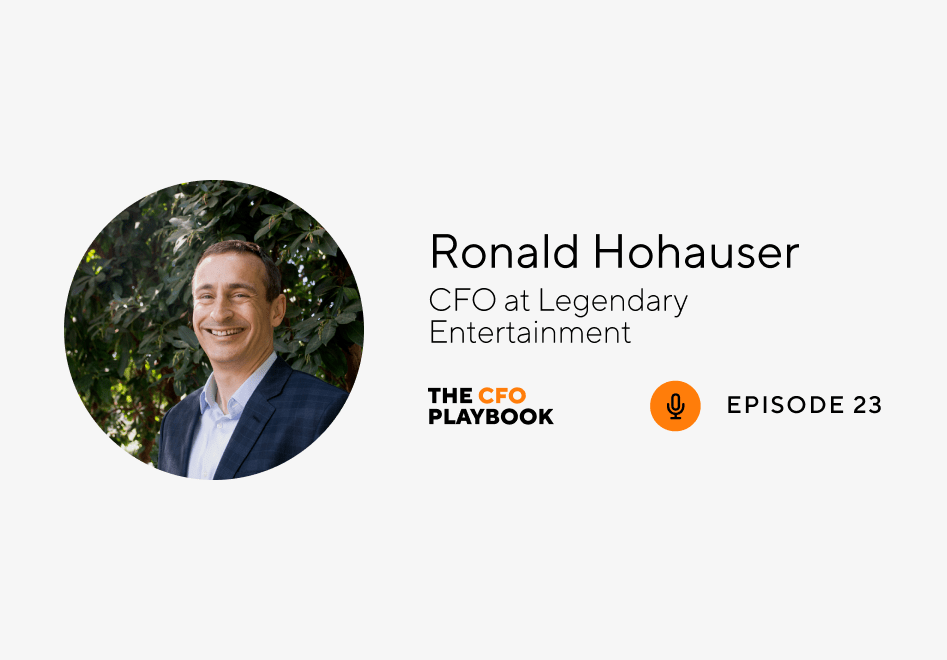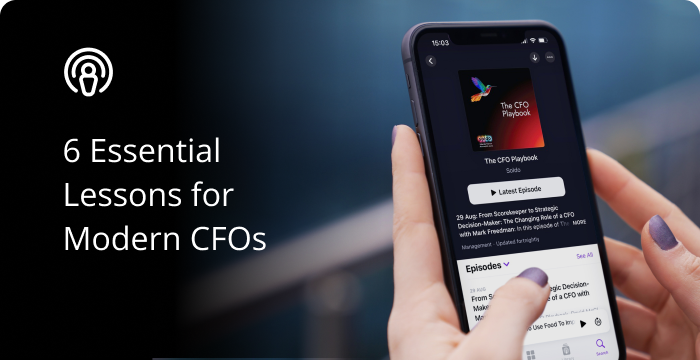How to handle work stress according to a Hollywood CFO
Tips from Legendary Entertainment CFO Ronald Hohauser on thriving in an unpredictable industry.
Listen to the full conversation
Ronald Hohauser has worked as a finance leader in the Hollywood filmmaking industry for over a decade, and if there’s one thing he’s learned, it’s how to work well under pressure.
Ron’s career highlights include being a part of the team that helped Marvel produce their first film in-house, and helping bring the Twilight novels to the silver screen through his work at Summit Entertainment.
He is currently CFO at Legendary Entertainment, the production company behind recent hits such as the Jurassic World series and Mamma Mia! Here We Go Again.
Ron joined us on The CFO Playbook where he talked about the role of a CFO in the entertainment industry and how to handle the ups and downs that come with the title.
Here are his tips for thriving in stressful environments:
Embrace adversity
Adversity is rarely welcomed by anyone, but the challenges and hardships it brings give you the resilience and experience you need to help you grow as a leader.
Before the unexpected success of the Twilight movies, Summit Entertainment produced quite a few failures. These failures, however, helped Ron and his team learn how to navigate both the highs and lows of the film industry.
Experiencing adversity early on can help you be more successful in the long term, Ron says:
‘Adversity builds character, it builds experience, it builds confidence, and there’s really nothing like that to give you the tools and the resilience that you need to make it through both the good times and the bad’.
Early successes can give you an unrealistic level of confidence. But in the film industry you need to know how to cope with the lows just as much as the highs, because both are inevitable.
Accept uncertainty
The movie industry, like many industries, can be very unpredictable. As such, Ron learnt how to deal with constant uncertainty.
You have limited control over what an audience (or customers) will or will not like, meaning every decision you make comes with a certain degree of risk.
To deal with that, you have to have the stomach for uncertainty, Ron says:
‘You have to develop the patience and resilience to ride the wave and to control and influence what you can and to understand that there’s a lot of things that you’re not going to be able to [control]’.
While uncertainty is something a CFO can’t avoid, it’s also important to not let fear of the unknown fuel your decisions. Take charge of the things you are in control of, and accept that some things are simply out of your hands.
Learn to delegate
CFOs need to learn how to leverage their team, particularly in high-pressure environments.
Early in his career, Ron wanted to have his hands in everything in order to learn and be more confident in his role. And while it’s good to get hands-on experience early on, it’s also vital to learn how to delegate as you progress in your career.
Even when working under intense pressure, you don’t necessarily need to work longer and harder, Ron says:
‘I realised that the highest value that I could provide was to manage and support and enable the team of people that work with me. I’ve become somebody who manages people rather than tasks, and that has gone a long way to ease that stress and to allow me to do my job better’.
Remember, you’re not alone. Instead, delegate and mentor your team so each person can work to the best of their ability.
Avoid burnout
It might feel impossible to avoid burnout when working in high-pressure environments, but it’s crucial for you as a leader to know when to end your workday and take care of yourself.
There will never be enough time to accomplish every task that needs to be done, Ron says, so you have to know when to say no.
‘What I learned is that there’s just going to be new stuff coming in tomorrow. So at some point, you have to be able to strike a balance and say, “I’m going to turn this off for the day”’.
Sometimes, you need to know when to live to fight another day, Ron says. If you want to be successful in the long term, you need to learn to pace yourself in the short term.
Show vulnerability
Being a CFO takes a lot of hard work and dedication. You have to be able to function well under pressure, push through failure and uncertainty, and lead your team well.
Rather than close yourself off and carry the burden internally, open up and be vulnerable with your team. Let them in on how you think, what you are going through personally, and in turn, show compassion towards their struggles.
Ron explained his transformation as a leader was due to the fact that he opened himself up to his team:
‘I decided when I came to Legendary that I wanted to do it differently. I wanted to connect with my staff. I want to get to know my staff as people, and I wanted to break away from my natural tendency to be maybe a little more introverted and make connections with the people that I work with. It’s all about communication. And the fact that I had made that effort and established those relationships and knew my team, that paid a lot of dividends’.
The more you get to know your team, the better able you are to motivate them through hard times.
Listen to the full episode
Hear the full conversation with Ronald Hohauser, and catch up on the latest episodes.










